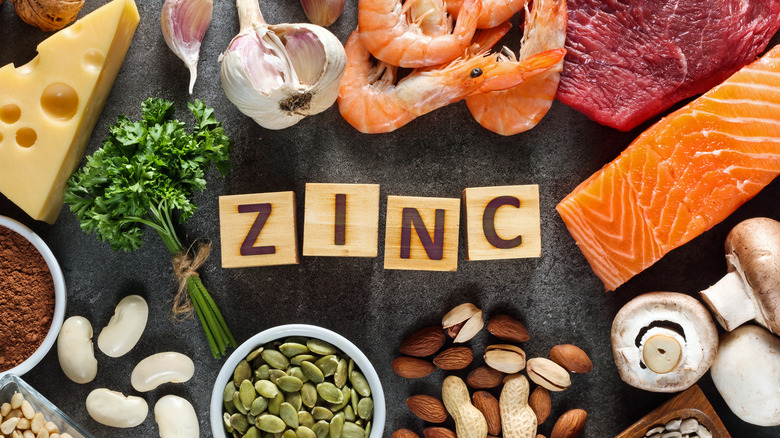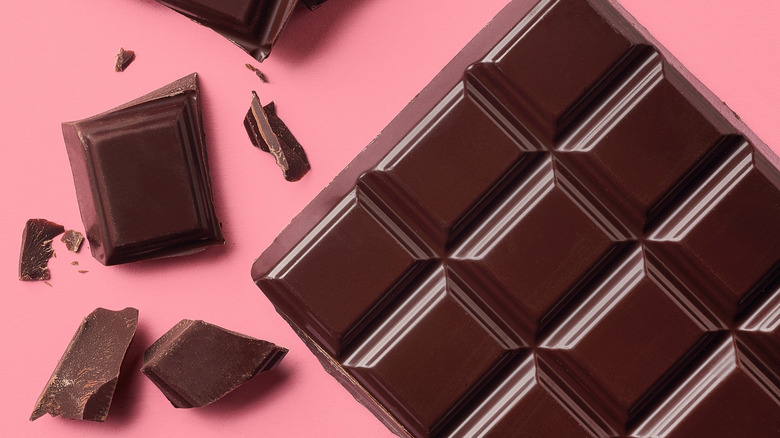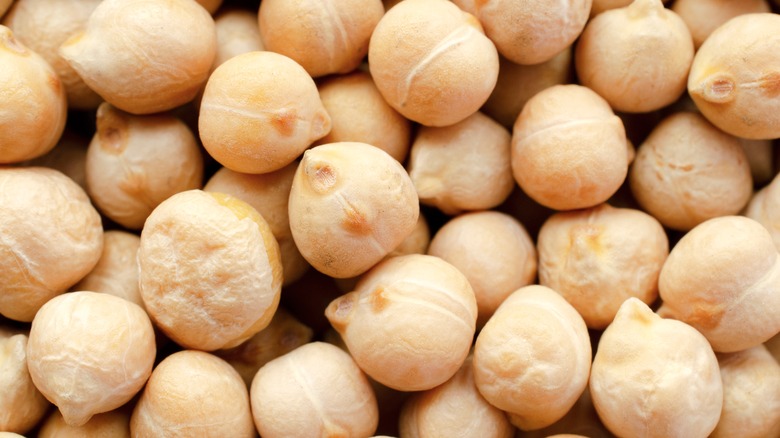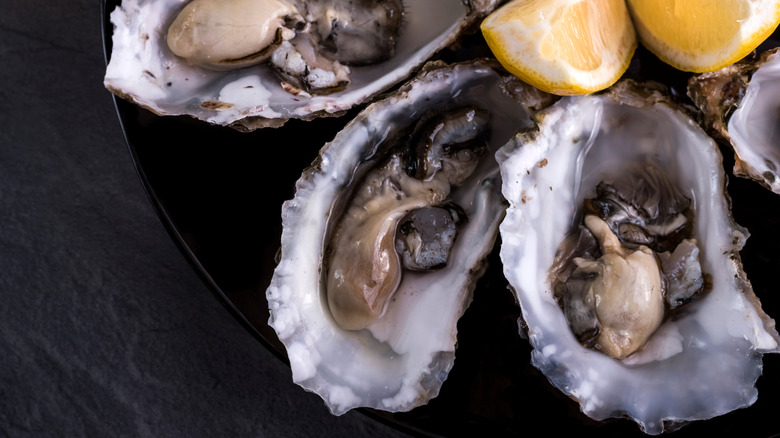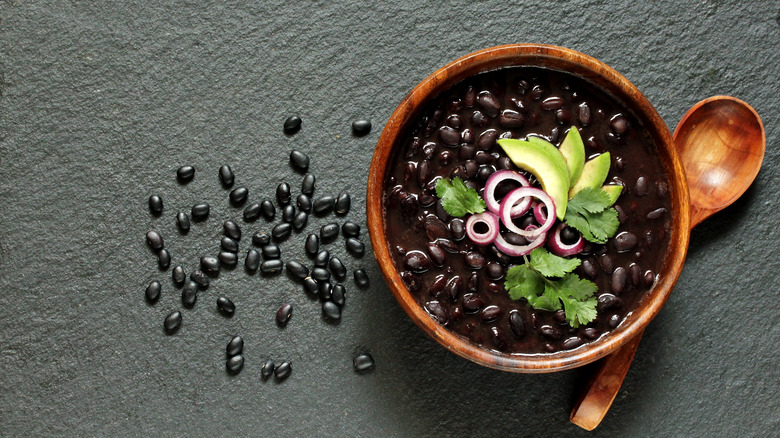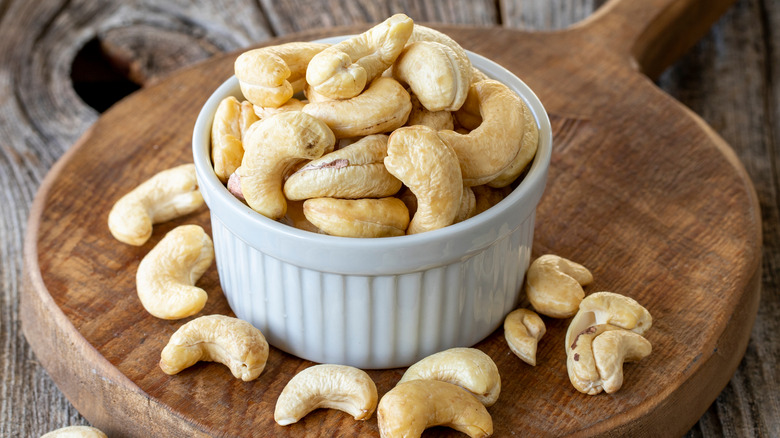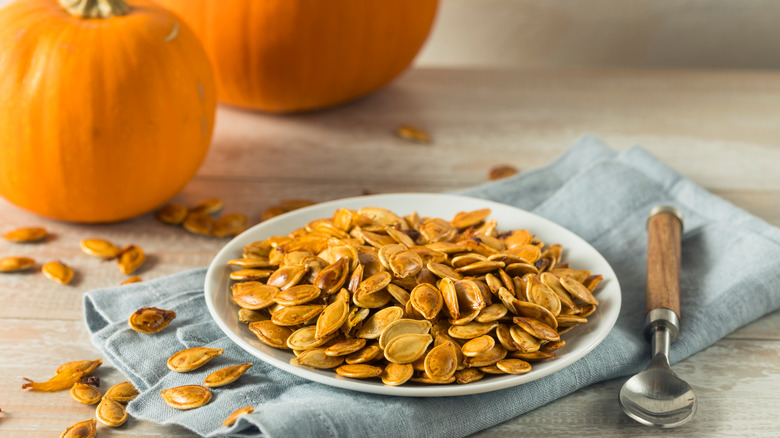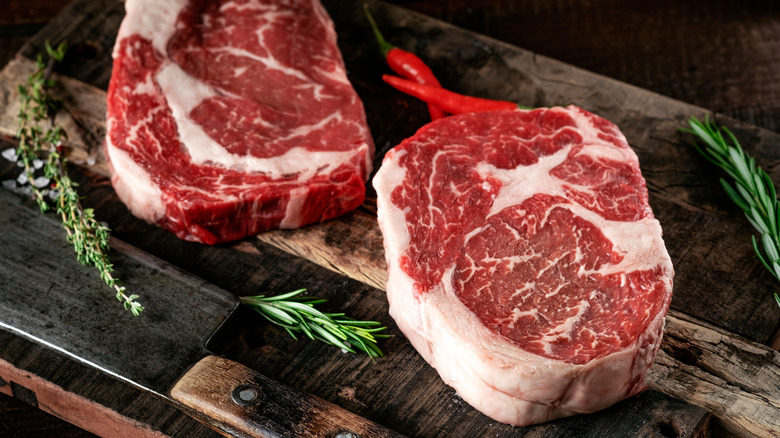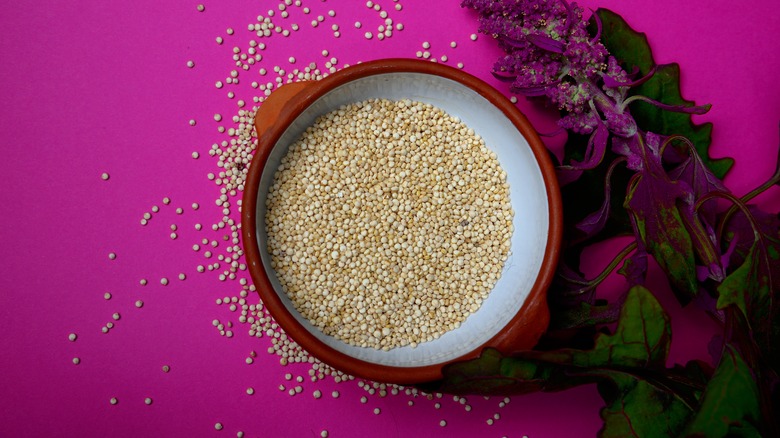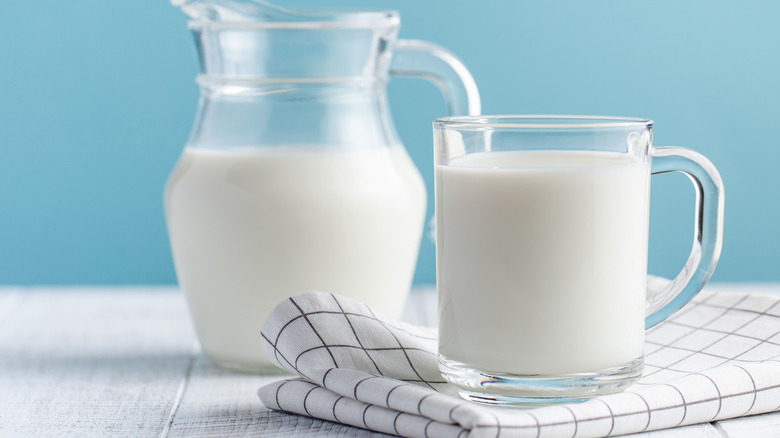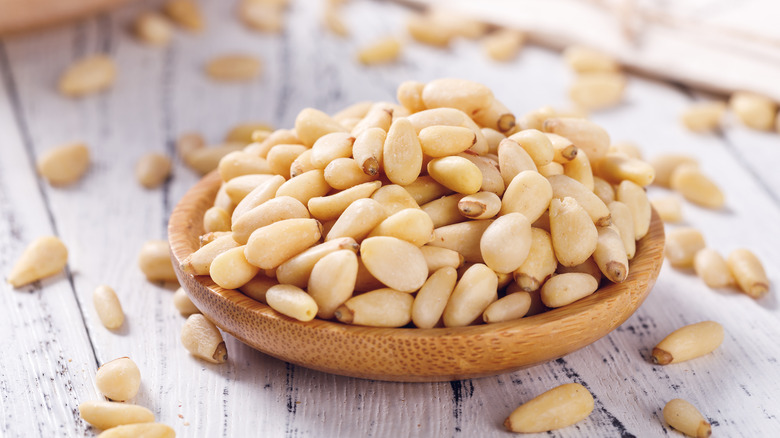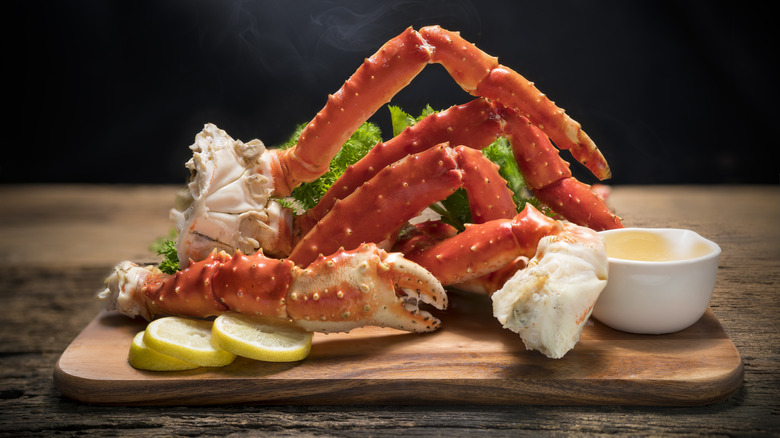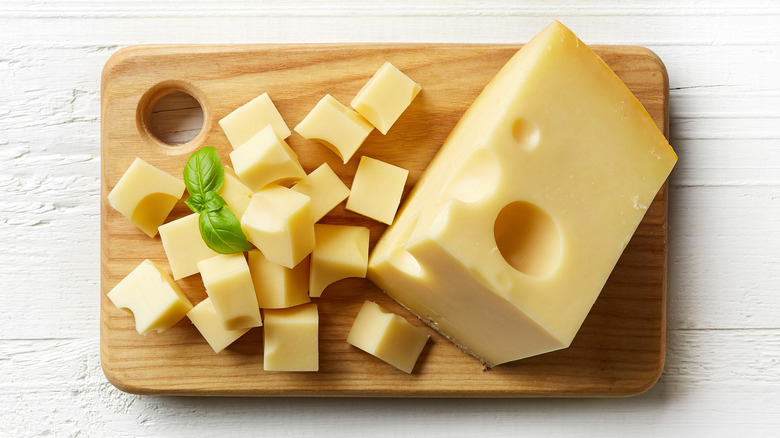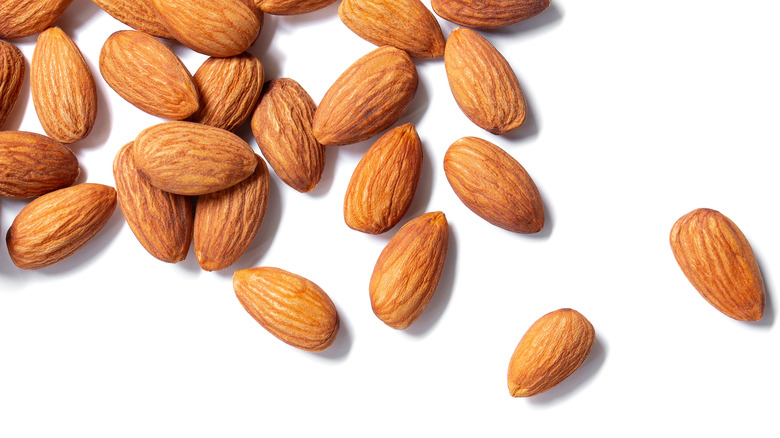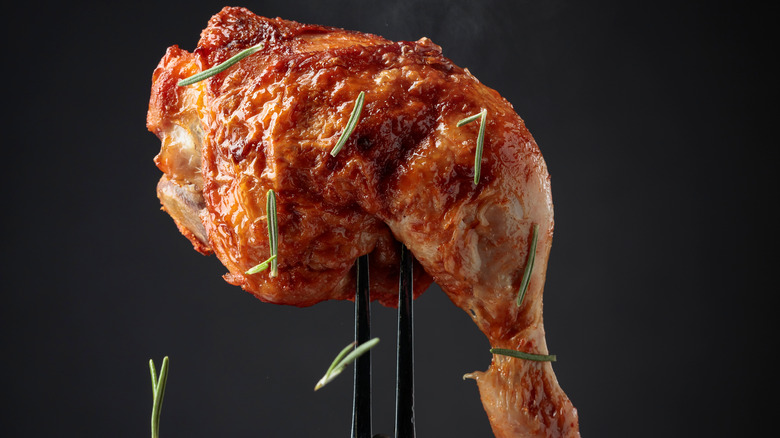Foods You Should Eat If You Need More Zinc
If you look at a bottle of multivitamins, you'll likely see it lists zinc as one of its nutrients. This isn't surprising, considering how important zinc is for your body. As WebMD explains, this mineral is crucial for a number of bodily functions, including keeping your thyroid, vision, and immune system working normally. It also helps your blood clot and your body heal from wounds, and even allows you to taste foods properly.
The reason zinc has such a widespread impact on your body is because it's a type of trace metal, according to the National Academy of Sciences. These metals or elements are necessary for the enzymes in your body to function properly. And as the National Human Genome Research Institute explains, enzymes are usually proteins that increase the speed of chemical reactions in your cells. In other words, if your zinc levels are too low, then it's a little like not using enough yeast when baking bread. Yes, the bread will still rise, but not as well as it should.
Fortunately, your body only needs small quantities of zinc, according to WebMD. But your body also doesn't store extra zinc, so not taking in enough of it on a regular basis can affect your overall health. Here are some foods you should eat if you need more zinc (Remember, though, that everyone's health needs are different, so you should always speak with a health care professional before changing your diet. Also, don't forget to exercise good portion control.)
Dark chocolate
It's tempting to eat way too much of this particular source of zinc. After all, some people would prefer sinking their teeth into a bar of dark chocolate than eating, say, baked beans (which are a great source of zinc, per Medical News Today). Plus, dark chocolate admittedly checks quite a few nutritional boxes. According to NutritionData, 3.5 ounces of dark chocolate with a cocoa content of 70-85% can give you more than a quarter of the recommended amount of zinc you should take in daily, as cited by Healthline.
But not so fast. As Healthline explains, that same 3.5 ounces is loaded with calories. In addition, Healthline points out that dark chocolate has sugar, which in large amounts can be bad for your health. And let's not forget that this cousin of milk chocolate contains caffeine, although probably not enough to interfere with your sleep patterns. The point is that it's especially important to exercise portion control when it comes to this food despite its zinc content.
With all that said, NutritionData notes that dark chocolate is also a good source of other nutrients besides zinc, including copper, potassium, iron, selenium, manganese, phosphorus, and magnesium. It's also packed with 11 grams of fiber and contains oleic acid, a fatty acid that could be good for your heart. And while it has palmitic acid (which could increase "bad" cholesterol), it also has stearic acid (which has the opposite effect).
Chickpeas
Anyone who's ever eaten hummus will be familiar with this next source of zinc. As WebMD explains, half a cup of these legumes contains about 1.3 mg of zinc. And while chickpeas are possible great additions to a healthy diet, how you prepare them can make a difference concerning your body's zinc intake.
But first, let's explore some of the ways chickpeas can be beneficial for your health. According to WebMD, chickpeas (whether they're dried or canned) are less likely to spike your blood sugar and your insulin. This is because it takes longer for your body to break them down, making them a potentially good choice for a diabetes-friendly meal plan. And speaking of digestion, the fiber in chickpeas can be helpful for someone who is having problems managing their cholesterol and/or having irregular or difficult bowel movements. Plus, chickpeas have been shown to be good additions to a meal plan for someone who wants to improve their memory, bone health, mood, muscle control, and mental health in general.
Despite all of the potential health pluses from eating chickpeas, WebMD notes that they also have substances called phytates. Unfortunately, these phytates can interfere with how your body takes in certain nutrients. The good news is that you can reduce the amount of phytates in them by preparing them the right way. For example, fermenting or cooking chickpeas can make a difference in terms of how much zinc your body absorbs from them.
Oysters
Oysters are often associated with romance. The Cleveland Clinic suggests that this might be because they are rich in zinc, which is considered "important to sexual health."
According to Medical News Today, oysters have more zinc per serving than just about any other food on the planet. In fact, the National Institute of Health's Office of Dietary Supplements says that a 3-ounce serving of oysters has a whopping 74 mg of zinc. But before you plan a romantic dinner featuring these little shellfish, keep in mind that there's hardly enough scientific evidence to support oysters' supposed ability to put someone in the mood, as stated in a 2013 paper in Pharmacognosy Reviews.
That said, oysters are also a good source of various essential nutrients like vitamins B12 and D, as well as selenium, iron, and copper (per the Cleveland Clinic). As registered and licensed dietitian Julia Zumpano told the Cleveland Clinic, "As women get older they can really benefit from this entire list of minerals, especially copper and zinc, which can assist in preventing macular degeneration." Besides containing nutrients, oysters are also excellent sources of protein. A helpful reminder: While oysters do vary in size, six oysters can provide roughly the same amount of protein as 2 ounces of meat.
Black beans
Did you know that black beans can be good for your bones? According to Medical News Today, several nutrients found in black beans can help your body build strong, healthy bones. And if you guessed zinc as one of these nutrients, you'd be absolutely right.
According to Women's Health Magazine, consuming one cup of cooked black beans will give you a quarter of the recommended amount of zinc you should consume daily. And as Medical News Today explains, the zinc and iron in black beans can help keep your joints and bones strong and flexible. Plus, these little legumes contain other bone-healthy nutrients like magnesium, copper, calcium, phosphorous, and manganese.
Beyond possibly being beneficial for your bones, black beans also have high amounts of fiber, which can help someone avoid blood sugar spikes. This makes them a potentially great addition for a diabetes-friendly meal plan. Additionally, they contain folate and vitamin B6, which can both help protect your blood vessels from damage. Plus, black beans are naturally low in cholesterol and sodium. A word of caution, though: The sodium content for canned black beans can sometimes be higher, depending on the manufacturer. Be sure to check nutrition fact labels and thoroughly rinse canned black beans before consuming them.
Cashews
Here's a fun fact: Cashews aren't nuts. No, really. According to Healthline, they're actually considered seeds. But even if they technically don't belong in a bag of mixed nuts, cashews can be a good way to up your zinc levels. An ounce of unsalted cashews that have not been roasted can give you 15% of the recommended amount of zinc you should take in daily. However, that's hardly the only nutrient these little seeds bring to the table.
Cashews are also an excellent source of copper, and contain other important minerals like manganese, iron, and magnesium. Additionally, cashews have vitamins like thiamine (or B1), B6, and K. And let's not leave out how cashews also contain fiber, which could help patients with type 2 diabetes manage their blood sugar levels (according to both the Journal of Nutrition and the Journal of Chiropractic Medicine).
Although there are quite a few possible pluses to incorporating cashews into your diet aside from their zinc content, how the cashews are prepared can make a difference in terms of your health. As Healthline explains, manufacturers sometimes add salt and oils to their cashews for distribution. So, make sure to compare nutrition facts labels before buying a particular brand of cashews.
Pumpkin seeds
When most people think of pumpkins, they usually focus on foods like pumpkin pie or pumpkin bread. However, if you want to up your zinc intake and are also having trouble getting a good night's sleep, you might want to put down the pumpkin spice latte and pick up some pumpkin seeds instead.
According to WebMD, the zinc found in pumpkin seeds — along with the selenium and copper — can help you sleep deeper and longer. In addition, pumpkin seeds have magnesium, a nutrient that can be a real stress-buster. And as anyone who's ever felt anxious and stressed out will tell you, it's harder to get a good night's rest when your mind won't stop racing. Plus, if that wasn't enough, pumpkin seeds also have the sleep-promoting amino acid tryptophan.
That said, even if you don't have trouble getting a good night's rest, you still should consider these little seeds. After all, the zinc found in them can help give your immune system a good boost. Pumpkin seeds' magnesium content can also help with blood pressure and blood sugar management. This means adding them to your diet could help lower the chances of developing health issues like diabetes and heart disease. Plus, pumpkin seeds are packed with other important nutrients like iron, vitamin K, potassium, manganese, and phosphorus.
Red meat
If "What are different types of red meat?" were a survey question on "Family Feud," chances are the answers would include steak and hamburger. However, according to the World Health Organization (WHO), red meat can come from the muscles of any mammal, including goats and lambs. Still, as WebMD notes, beef in particular is a great source of zinc, with a 3 oz serving of beef chuck roast containing 8.44 mg of the nutrient.
Of course, there are health concerns when it comes to consuming red meat. As Medical News Today points out, research has found connections between eating red meat and developing heart health issues. However, not every study has reached the same conclusions. A 2016 study published in the American Journal of Clinical Nutrition, for example, concluded that eating 3-ounce servings of red meat three times a week didn't seem to up one's chances of developing heart problems. On the other hand, a report from the WHO supported the notion that red meat consumption could raise the risk of developing cancer.
That said, red meat does contain quite a few nutrients besides zinc, including vitamins B3 and B6, as well as iron and selenium (per Medical News Today). If you want to add more red meat to your diet, you should speak with a health care professional — and even if they approve of increasing your red meat intake, you still need to practice proper portion control.
Quinoa
If you have to avoid eating gluten, then you're probably already familiar with quinoa. After all, it naturally doesn't contain gluten, making it a good replacement for other grains (per Healthline). But rather than focusing on what quinoa doesn't have, let's talk about the nutritious value it can bring to your meals.
According to the USDA, one cup of cooked quinoa is loaded with nutrients, including zinc. Consuming one cup as a side dish at dinner can give you about 18% of your daily recommended zinc intake. But that's not all. Those tiny little grains contain manganese, phosphorus, magnesium, copper, potassium, and iron. In addition, they have folate (vitamin B9), vitamin E, and vitamin B6, among others. Furthermore, according to a 2019 paper in the journal Molecules, quinoa has compounds that might help reduce inflammation and protect your health on a cellular level.
There's one more important thing to note about this grain. Cutting gluten can mean cutting fiber, magnesium, and other important nutrients, as enumerated by Healthline. But since quinoa contains fiber as well as zinc and other vitamins and minerals, adding this grain to a gluten-free diet can be very beneficial for one's health.
Milk
Public opinion about milk has gone back and forth over the years. On the one hand, there were the "Milk: It does a body good" commercials that linked drinking milk to various health benefits. And yet, as Medical News Today points out, milk does contain large amounts of saturated fats. Nevertheless, there can be health benefits from portion-controlled consumption of cow's milk, including its zinc content.
According to the USDA, one cup of nonfat milk has 1.1 mg of zinc. And if you aren't a fan of nonfat, you get only slightly less zinc — 0.05 mg less, to be precise — from the same amount of low-fat milk. In addition, the Dietary Guidelines for Americans 2015-2020 states that milk, including the kind from cows, contains minerals like magnesium, selenium, calcium (which can be good for your teeth, bones, nerves, and muscles) and potassium (which can help manage blood pressure, per Medical News Today). Moreover, milk contains vitamins like riboflavin, vitamin A, and (if the milk has been fortified) vitamin D.
Still, you should speak to a health care professional before adding more milk to your diet. They might have suggestions about which type of milk (nonfat, low-fat, etc.) is best for your health needs.
Pine nuts
Have you ever wondered why pine nuts tend to be so expensive? Well, according to Healthline, it's because it can take as long as 25 years for pine nuts trees to reach the point that they're able to produce pine nuts fit for consumption. And then, they still need to mature beyond that to grow to peak maturity. But as the saying goes, good things are worth waiting for.
These little nuts are good sources of zinc. As registered dietitian Maggie Michalczyk told Men's Health, "Pine nuts contain about 6.5 grams of zinc per 3-ounce serving." In addition, incorporating pine nuts into your diet can help with other health concerns. For example, the type of fat in pine nuts, as well as their fiber and protein content, can help with weight management, per Healthline. Why? Because unlike when you eat some other foods, pine nuts leave you feeling satisfied for a longer period of time, making you less likely to snack more. Plus, according to research published in The American Journal of Clinical Nutrition, the unsaturated fats in pine nuts could be good for blood sugar management (as explained by Healthline).
Besides their zinc levels and possible weight and blood sugar management benefits, pine nuts might also be good for your heart. Specifically, the pinolenic acid found in pine nuts might help lower LDL cholesterol (also known as "bad" cholesterol).
Crab
Apologies to Sebastian, the singing crab in Disney's "The Little Mermaid." According to Men's Health, crab (specifically Alaskan King Crab) is a great source of zinc. Every 3.5 ounces of Alaskan King Crab is packed with 7 mg of zinc.
The nutritional benefits don't stop there, though. Alaskan King Crab is an excellent source of vitamin B12. How excellent? Well, get ready to read something that's going to look like a typo. A 3-ounce serving has roughly 9.8 mcg of B12 or 163% its daily value. This means you'd be consuming 63% more B12 than the recommended intake per day. In addition, it contains other nutrients like copper, phosphorus, and folate. Plus, according to Health, crab is also a good source of magnesium, making it potentially beneficial for your muscles and your heart. Oh, and it also has vitamins C, B, and A.
While there are some definite pluses to eating crab, there are also some drawbacks. As Men's Health points out, Alaskan King Crab is high in sodium: A 3-ounce serving has more than 900 mg of salt. So if you're watching your sodium consumption, you might want to avoid adding salt to your other meals on the day you'll have that hearty crab lunch.
Swiss cheese
Usually, when one thinks of Swiss cheese, two qualities come to mind: its holes and its flavor. In fact, this cheese has a very distinct taste that might not be for everyone. But even if you've written it off in the past, you might want to reconsider it — and not just for its zinc content.
As registered dietitian Natalie Rizzo tells Taste of Home, "One ounce of Swiss cheese has 1.2 mg [of zinc]—or about 8 percent your daily value." Plus, Food & Wine points out that Swiss cheese is significantly lower in lactose than other cow's milk-based foods, making it a potentially good go-to cheese for someone who is lactose intolerant. Add to that how it's also a good source of phosphorus, calcium, and protein, and you're looking at a healthy addition to your weekly meal plan.
Beyond the nutrients in Swiss cheese, scientists from the University of Korea found it contains propionibacterium freudenreichii, a probiotic that could have a positive impact on your body's immune system (per Scientific Reports). In addition, propionibacterium freudenreichii has anti-inflammatory properties, which could mean Swiss cheese can help your body age more slowly. Think of inflammation as the wear and tear on a car. The less wear and tear, the longer the car runs like new.
Almonds
Did you know that almonds are in the same plant family as roses? Surprisingly, an almond is technically considered the kernel of a fruit, even though we think of it as a nut. That said, this crunchy food can be a good go-to snack or addition to a meal if you need more zinc in your diet.
According to the USDA, an ounce of almonds (roughly 23 kernels) would contain about 0.9 grams of zinc. And as Clinical Cases in Mineral and Bone Metabolism notes, zinc, along with other nutrients found in almonds like copper, calcium, and vitamin K, can help keep your bones strong and healthy. But that's only the tip of the iceberg when it comes to the nutrients in almonds.
Almonds are especially rich in potassium, phosphorus, and magnesium (via Medical News Today). Other nutrients found in these crunchy treats include manganese, iron, selenium, vitamin E, and folate. Plus, they're good sources of protein and fiber. And, yes, almonds do have a notable amount of fat — but the good news is, it's unsaturated rather than saturated. Per the American Heart Association, unsaturated fat could actually help manage blood cholesterol.
Chicken
Imagine this scenario: You're at a barbecue, and your friend is grilling some chicken. Eventually, the food is ready, and you're handed a serving plate full of breasts and drumsticks. Which would you choose: the light meat or the dark meat? Regardless of your answer, consuming chicken can be a good way to get a large dose of zinc.
Registered dietitian nutritionist Meme Inge told Women's Health Magazine that both the white and the dark meat from chicken is loaded with not only zinc, but also selenium, niacin, pantothenic acid, phosphorus, vitamin B6, and riboflavin. In addition, both types of chicken meat are iron-rich. In fact, according to Inge, the iron contained in dark meat "is more easily absorbed than the iron found in plants."
Despite chicken's potential upsides as a part of one's diet, it doesn't mean that both white and dark meat chicken are free of any possible drawbacks. For one, chicken does contain saturated fat — and as registered dietitian nutritionist Marisa Moore shared, there's more saturated fat in dark meat than in white meat (per Women's Health Magazine). However, the majority of the fats in chicken are monounsaturated fats, which are considered better for you than saturated fats. In an article for Food Network, registered dietitian Dana Angelo White stated that chicken skin has "a hefty amount of fat." Thus, taking the extra time to remove the skin from chicken can help you prepare a healthier meal.

